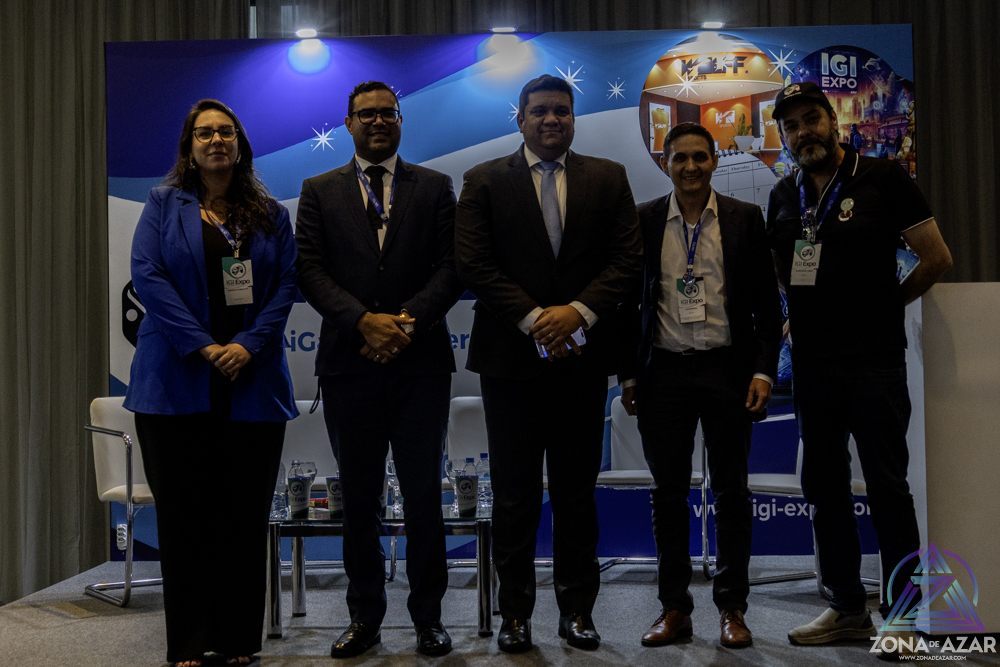IGI Expo: Integrity in Sport in the Age of Sports Betting

Brazil.- 18th November 2025 www.zonadeazar.com As part of the IGI Expo, held at the Blue Tree Premium Morumbi Hotel Convention Center in São Paulo on November 12 and 13, an interesting panel discussion took place on a topic that is central today: Integrity in sport in the age of sports betting.
During this panel, representatives from federations, leagues, and monitoring entities agreed on one key point: combating match-fixing requires ongoing education for all stakeholders and coordinated action between clubs, federations, betting houses, regulators, and monitoring companies.
The following experts participated in the panel: Alessandro Lisboa, founder of IGI Expo; Mariana Chamelette, lawyer specializing in sports law; Juan Matías Mendez, Technical Director of Sports Integrity Protection at ABC-BET; Fred Justo from Legitimuz; and Filipe Rodrigues from IGE, Instituto de Gestão Esportiva.
Betting, soccer, and public image
The distinguished panelists noted that, although sponsorship from betting companies is now a significant source of income for soccer, there is a misconception that the sport “depends” exclusively on them or that betting is, by nature, a risk to the integrity of the game.
They stressed that, in cases of detected manipulation, the main parties involved are usually individuals—especially athletes—and not the clubs or the betting houses themselves, for whom fraud is also detrimental, both in terms of image and financially.
The case of the São Paulo Football Federation: education and monitoring
The São Paulo Football Federation presented a case study that is considered a benchmark for other Brazilian federations. Among the notable initiatives mentioned were:
- Inclusion of integrity content in technical meetings with club officials before each competition.
- Lecture programs at clubs, with in-person visits to teams to explain to players what match-fixing is, how criminal groups usually approach them, and what the sporting and criminal consequences are.
- Training referees and match directors to act as “sensors” on the field of play.
- Partnerships with companies specializing in betting monitoring, which issue technical reports when they detect suspicious patterns in the markets.
As explained, these reports cross-reference data on behavior on the field (position, decisions, previous patterns of the athlete in other matches) with information from the betting markets.
The most serious cases lead to investigations in sports courts and, eventually, sanctions against those involved.
Brazil, leader in suspicious games… and in regulatory reaction
One of the facts mentioned is that, in 2022, Brazil was the country with the highest number of matches classified as “suspicious” by international monitoring bodies. Although the percentage remains small compared to the total volume of matches, the figure set off alarms.
According to experts, the new regulation and increased negative visibility accelerated the reaction of federations, confederations, data companies, and operators, who began to treat integrity as a strategic issue, central to the credibility of competitions and the betting market itself.
Technology and warning signs
Experts detailed how manipulation can now be detected thanks to a combination of:
- Internal data from bookmakers (unpatterned bets, high amounts, concentration of bets in the same market, very close schedules, same IP or same region of origin).
- Comparison of odds and movements in international markets, especially in regions where there is a high volume of gambling.
- Anonymous reporting platforms in federations and confederations, which allow fans, referees, or officials to report suspicious behavior.
- Video analysis and technical behavior of players and teams, comparing specific plays with the athlete’s history.
The reports produced by these companies are used as evidence in sports courts and, as indicated, have been validated by both national authorities and the Court of Arbitration for Sport (CAS) in international cases.
Role of bookmakers: from victims to allies
Under Law 14.790, operators wishing to operate in a regulated manner in Brazil must have specific corporate policies in place to combat manipulation, be associated with integrity bodies, and report suspicious cases to the competent authorities.
The panelists noted that, in a manipulated game, the bookmaker is often the financial victim: it loses money and reputation. For this reason, they argued that the operational and trading areas must be coordinated with compliance and legal departments so that warning signs are turned into formal reports and not treated as a “normal business loss.”
At the same time, they acknowledged that historically many operators were reluctant to report for fear of reputational damage, and that the regulatory framework is precisely intended to enforce a culture of transparency and cooperation.
Integrity: much more than match-fixing
One of the lawyers defined integrity as a “mandala,” in which the manipulation of results is only one point. This agenda also includes the fight against racism, homophobia, violence in stadiums, harassment, the protection of diversity, and governance (ESG).
Even so, it was made clear that the most sensitive intersection between the sports industry and the betting industry is the manipulation of results. If the public loses confidence in the honesty of the competition, everyone loses: clubs, leagues, operators, suppliers, and fans.
Continuing education and emblematic cases
Throughout the panel, the word “education” appeared as a common thread. Not only in relation to players—from youth divisions to professionals—but also to referees, managers, traders, risk analysts, and compliance teams at betting houses.
Recent high-profile cases of soccer players under investigation or sanctioned were mentioned, highlighting regulatory gaps, inconsistent treatment, and the need for clearer rules. Without going into the specifics of each case, the panelists argued that sanctions should also serve an educational purpose: to send a clear message to the rest of the ecosystem.
In closing, the panel agreed that manipulation will never completely disappear — “where there is money, there is crime,” as one of the experts summed up — but that the combination of regulation, technology, international cooperation, and, above all, ongoing education can minimize the problem and protect what is at the heart of it all: the credibility of the sport.
Edited by: @MaiaDigital www.zonadeazar.com